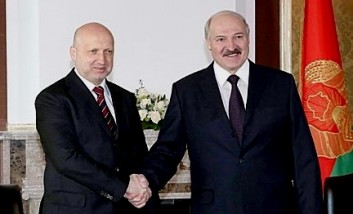Official Minsk continues to lose its independence in foreign policy
 The situation has not changed
The situation has not changed

Official Minsk yielded to the Kremlin’s pressure and recognised Crimea’s annexation, meanwhile, Lukashenko attempted to neutralize these actions with several statements. As Belarus’ dependence on Russia increases, she has increasingly less room for manouevre. However, the Belarusian authorities are using the Ukrainian factor to strengthen their domestic positions and to strengthen national security.
Belarus voted against the UN resolution on Ukraine’s territorial integrity. However, on March 28th and 29th, Alexander Lukashenko attempted to ‘rehabilitate’ himself vis-a-vis Ukraine by explaining his position and offering mediation.
Belarusian leadership was unable to escape from being drawn into the Russian- Ukrainian conflict on the Kremlin’s side. They have allowed Russia to strengthen its military presence in Belarus, have recognized Crimea ‘de facto’ Russian and have voted against the UN resolution on Ukraine’s territorial integrity.
Meanwhile, in the given circumstances, the Belarusian authorities understand the importance of not destroying Belarusian-Ukrainian relations. They attempt to compensate their actions with the official statements in the media space.
The Belarusian Foreign Ministry attempted to mitigate their responsibility for voting against the Ukraine’s integrity at the UN General Assembly, by saying that “peace and security issues are not in the UN General Assembly’s primary competence, but in the UN Security Council’s”.
In an interview with one of the most popular Ukrainian TV shows, ‘Shuster Live’, President Lukashenko made several statements, which provoked sympathy from Ukrainian audiences. For example, the President commented on Ukrainian authorities: “Russia can say anything against the authorities in Ukraine now… Today [Russia] is the real power, which makes decisions and takes actions. And acts effectively, whether right or wrong, but it starts actions”. It is noteworthy that Lukashenko is a rather popular politician among a significant part of the Ukrainian population.
In general, Lukashenko has recognised Crimea Russian territory ‘de facto’. Moreover, Lukashenko stands for disarmament of Maidan fighters and for a cautious attitude towards the Russian language’s official status. His positions differ from Russia’s (yet) as follows: Lukashenko is for holding the presidential elections on May 25th; he is ready to recognize any power in Kiev; he is against the federalization of Ukraine; he considers Ukraine’s invasion by Russian troops unacceptable. In fact, Lukashenko’s position could become a compromise between the Ukrainian and Russian authorities.
On March 29th, Lukashenko met with Acting Ukrainian President Turchynov in the village Lyaskovichi, Gomel region. The leaders discussed cooperation opportunities in the given circumstances and Lukashenko assured Turchinov that Ukraine’s invasion by Russia from Belarus was impossible.
The developments in Ukraine have prompted the Belarusian authorities to strengthen focus on ensuring national security. This year, the Belarusian parliament plans to adopt a law establishing a special foreign intelligence service, whose functions are currently performed by the KGB.
In addition, Belarusian leadership strengthens its anti-corruption rhetoric. At a meeting dedicated to improving admission to universities and colleges, Lukashenko said, “God forbid we find any corruption in our universities. After the events in Ukraine, only an idiot will not make proper conclusions”. Following his statement, the law enforcement agencies have launched 15 anti-corruption show-cases against several officials.
Having no funds to ensure pay-rises and maintain substantial social guarantees, President Lukashenko hopes to enlist the populations’ support with the anti-corruption rhetoric and by opposition the situation in Belarus to ‘the country’s collapse, which occurred in Ukraine’.
Belarus’ dependence on Russia is increasing to a critical state and Belarus has nothing to balance out the Kremlin’s pressure. Official Minsk will continue losing the ability to carry out independent foreign policy, especially on issues, crucially important for the Kremlin.
Subscribe to our newsletter




Situation in Belarus
Constitutional referendum: main consequences


 Video
Video
How to count the political prisoners: are the new criteria needed?


 Video
Video
Paternalism In Decline, Belarusian Euroscepticism, And The Influence Of Russia


 Video
Video











